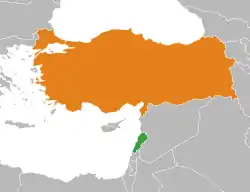Lebanon–Turkey relations
Lebanon–Turkey are the bilateral relations between Lebanon and Turkey. Lebanon has an embassy in Ankara and a consulate general in Istanbul. Turkey has an embassy in Beirut. The two nations are connected through history as Lebanon gained independence from the Ottoman Empire.[1] Both countries are members of the Union for the Mediterranean and Organisation of Islamic Cooperation.
 | |
Lebanon |
Turkey |
|---|---|
Historical relations
The Ottoman Empire, which controlled Lebanon from 1516 to 1918, had Lebanon as the most diverse region in the Ottoman Empire. There were several ethnic and religious tensions, notably the infamous 1840 Lebanon conflict and 1860 Mount Lebanon civil war which devastated Lebanon and the Ottomans further imposed strict rule in Lebanon.[2][3]
During the World War I, the Ottomans imposed a forcible blockade to prevent supplies from being taken by the French and the British. However, this resulted in the Great Famine of Mount Lebanon, which claimed the lives of a half of the Lebanese population at the time. This formed the basic disdain and hostility against Turkey among Lebanese population.[4]
Modern relations
Humanitarian aid
Lebanon has been a major recipient of Turkish aid.
During the 2006 Lebanon War, in tandem with shipments of aid the Palestinians sent on 19 July and 27 July, the Red Crescent announced on 31 July that two Arctic trucks carrying medical aid, foodstuffs and kitchen utensils were being sent from Turkey to Lebanon.[5]
In 2013, following the increasing shortages of electricity in Lebanon, Turkey supplied the country with MV Karadeniz Powership Fatmagül Sultan and MV Karadeniz Powership Orhan Bey to ensure electric development for the country.[6]
During the Lebanese liquidity crisis, Turkey provided humanitarian assistance to Lebanon in April 2022. They delivered shipments of food, baby formula, and basic needs.[7][8][9]
Competing with Iran
The Turkish Government under Recep Tayyip Erdoğan has perceived Hezbollah, a Shi’a paramilitary and political group backed by Iran with a negative perception, based on historical trauma in Lebanon and the threat to Turkish legacies in Lebanon. Thus Turkey has sought to maintain closer tie with Lebanon, to dismantle Iranian influence inside Lebanon. The influx of Hezbollah fighters coming to Syria fighting against the Syrian National Army[10] is also the reason why Turkey tries to establish stronger ties with Lebanon in order to weaken Iran's role in Lebanon.
Turkish influence
While Lebanon has been relatively out of the knowledge of the Turkish population, the recent political brawl had led to some several fallouts of relationship. In September 2019, Lebanese President Michel Aoun tweeted his criticism on the Ottoman rule and expressed concerns about the return of Turkey to Lebanon, and summoned the Turkish ambassador as well.[11] This had drawn criticism in Turkey as a denial campaign against the Ottoman heritages.[12] Lebanon recognizes the Armenian Genocide.[13]
After the 2020 Beirut explosions, Vice President of Turkey, Fuat Oktay, and Foreign Minister, Mevlüt Çavuşoğlu, visited Lebanon and met Lebanese President Michel Aoun and Parliament Speaker Nabih Berri.[14] During the visit, Çavuşoğlu said:
We also stand with our kin, the Turks and Turkmens in Lebanon and around the world. We will grant Turkish citizenship to our brothers who say 'I am Turkish, I am Turkmen,' and express their desire to become a citizen. These are our [Turkish] President [Recep Tayyip] Erdoğan's instructions.
— [14]
References
- Iran Daily
- Kirk, George (1 December 1960). "Lebanon in the Last Days of Feudalism, 1840-1868: A Contemporary Account by Antūn Dāhir Al-e ʽAqiqi and other Documents . Malcolm H. Kerr". The Journal of Modern History. 32 (4): 396. doi:10.1086/238645.
- Heraclides, Alexis; Dialla, Ada (2015). "Intervention in Lebanon and Syria, 1860–61". Humanitarian Intervention in the Long Nineteenth Century: 134–147. doi:10.2307/j.ctt1mf71b8.12. ISBN 9780719098598. JSTOR j.ctt1mf71b8.12 – via JSTOR.
- "Reconstructing the Disastrous History of the Lebanese Famine | Al Jadid". www.aljadid.com.
- (in Turkish) Red Crescent Aid Convoy Leaves Turkey for Palestine Archived 2011-06-05 at the Wayback Machine, ZAMAN Daily Newspaper
- "The Turkish 'power ship' keeping the lights on in Lebanon". the Guardian. 11 April 2013.
- "1,000 tons of Turkish food aid delivered to needy people in Lebanon". Daily Sabah. 14 April 2022. Retrieved 26 July 2023.
- "Turkey sent more humanitarian aid to Lebanon". Hürriyet Daily News. 2 April 2022. Retrieved 26 July 2023.
- "Humanitarian Aid Ship from Türkiye Reached Lebanon - Lebanon". reliefweb.int. 7 April 2022. Retrieved 26 July 2023.
- "Turkey: Lebanon's Hezbollah Should Leave Syria | Voice of America - English". www.voanews.com.
- "Lebanon summons Turkish ambassador after president raised Ottoman era atrocities". Arab News. 3 September 2019.
- Gürbüz, Şeyma Nazlı (7 September 2019). "Lebanon twists historical facts on Ottoman heritage under influence of regional actors". Daily Sabah.
- International Affirmation of the Armenian Genocide, armeniaforeignministry.com
- "'Turkey ready to send more aid to Lebanon'". aa.com. 8 August 2020.
